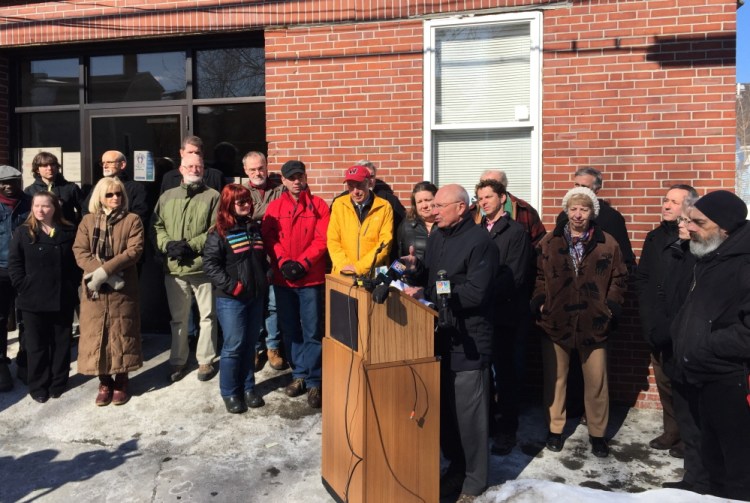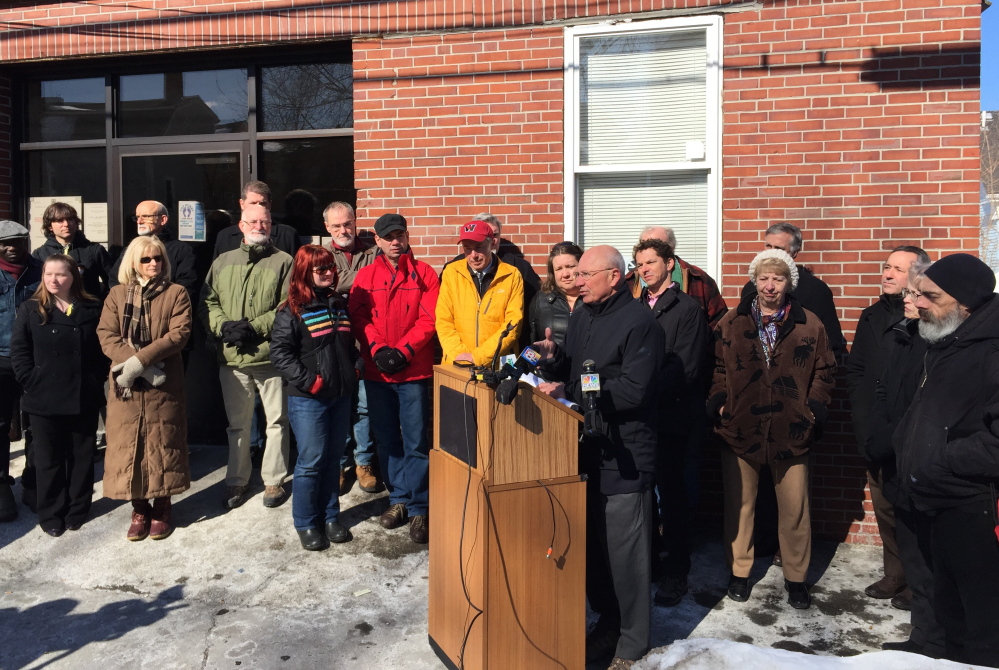Portland officials and state legislators defended the city’s General Assistance spending Friday against what they described as a skewed portrayal of the program by the LePage administration, while also pledging to address concerns raised by a recent state audit.
“We are ready, we are willing and we are certainly able to work with the department and respond to the issues that they have raised,” said Portland Mayor Michael Brennan, referring to the Maine Department of Health and Human Services.
More than two dozen city leaders and advocates for the homeless gathered in the cold outside the city’s largest shelter on Friday to respond to a weeks-long campaign by the LePage administration that has made Portland the focal point of the latest debate over welfare reform. Frustrated by what they view as unfair “coordinated attacks” on the city’s welfare programs, the group said Portland’s experiences highlight the urgent need to improve how the state handles the homeless and mentally ill.
Friday’s press conference – coming four days after the public release of a state audit sharply critical of Portland’s use of state funds – could also signal a more aggressive campaign by the city as lawmakers consider major changes, sought by Gov. Paul LePage, to how the state reimburses municipalities for General Assistance.
“What we are trying to share today is that there is more to the story than just the numbers being spun by this administration,” said Sen. Justin Alfond, D-Portland. At the same time, Alfond said, “We find the GA audit troubling and we are ready to work on this together.”
On Feb. 20, DHHS delivered an audit to the city that found 13 of 30 “long-term stayers” within the city’s homeless shelters had at least $20,000 in the bank. The audit report says the city used state General Assistance funds to pay for their use of the shelter even though the individuals did not qualify for the aid.
The audit followed an earlier DHHS analysis showing that Portland accounted for 63 percent of state reimbursements last year to municipalities for General Assistance despite comprising only 5 percent of the state’s population.
City officials have responded by saying DHHS is neglecting Portland’s role as the state’s largest social services center and ignoring the fact that many long-term residents of the shelters have severe mental illnesses that prevent them from managing their own financial affairs. They also point out Portland’s growth in General Assistance expenditures – from $5.6 million in 2009 to $10 million last year – is being fueled by an influx of immigrants ineligible for federal aid as they apply for asylum in the U.S. Other Maine cities have not seen the same influx of asylum seekers.
The General Assistance dispute underscores the growing political gap between the leadership of Maine’s heavily Democratic city and the Republican LePage administration.
‘ACCOUNTABILITY, ENFORCEMENT’
LePage’s plans to rewrite the General Assistance reimbursement formula, which the governor says would end a “perverse incentive” that encourages higher spending, would cost Portland $4.3 million out of a program with a total budget of roughly $10 million last year. Additionally, the city could lose more money if it can no longer presume those staying in city shelters automatically qualify for General Assistance, which provides temporary, emergency aid for housing, food and other basic necessities.
DHHS Commissioner Mary Mayhew said Friday in an interview that the LePage administration is “committed to accountability and enforcement of the laws and regulations in order to ensure there is integrity in the use of these funds.”
Mayhew said the issue is that Portland is getting GA reimbursements for people staying at the city’s shelter who do not qualify based on financial need. It is not about whether mentally ill people should have access to public assistance, she said.
“I’m troubled and concerned about the distortion of this discussion,” said Mayhew, noting that the state has provided $4 million since 2010 to Portland to house people with mental illness. “And frankly my concern is that the city is using the mentally ill inappropriately in this discussion.”
Several speakers discussed the well-documented link between homelessness and mental illness on Friday.
Mark Swann, executive director of the nonprofit Preble Street, which provides many services to Portland’s homeless community, said a recent survey of the shelter system’s 30 longest-term residents found that all 30 “had serious and persistent mental illness.” Swann said shelters in Maine have become de facto mental health institutions and are “overflowing with people who absolutely should not be there … because it is inhumane that our mental health system is unavailable and inaccessible to them.”
Five nonprofit agencies have stopped providing shelters in Portland during the past decade because of funding uncertainty, Swann said, and those clients inevitably ended up in the remaining shelters. Swann agreed that General Assistance is the wrong mechanism for funding emergency homeless shelters but added there are few other funding sources available.
“Funding for emergency shelters in this state has not been thoughtfully discussed or debated for over 25 years,” Swann said.
‘IT’S A MATTER OF WHO PAYS’
LePage also weighed in on Friday, issuing a news release to hold up the city’s General Assistance expenditures as an example of municipal overspending.
“My quarrel is not with the people who stayed at the shelter,” LePage said in a statement. “Mental illness often plays a role there. It’s a matter of who pays. The City of Portland knew these people had this money in the bank, but they decided to bill the taxpayers anyway for years’ worth of welfare reimbursement. Municipalities complain about losing revenue sharing, but then I see abuse like this. When municipalities set priorities that unfairly burden Maine property taxpayers, it’s hard to have sympathy for them.”
BRENNAN, MAYHEW SPAR
City officials pointed out Friday that DHHS repeatedly signed off on the way Portland operated its General Assistance program. To counter DHHS claims of city mismanagement, Brennan read from six nearly identical letters sent annually to Portland from the agency between 2008 and May 2013, stating that “Portland is in compliance with the General Assistance statutes and the Department of Health and Human Services’ General Assistance policy.” Three of those compliance letters were sent by the LePage administration.
Mayhew did not know what type of information was examined during previous audits, bu said reviews “are based on information that is provided at that time” and that city officials should focus their attention on the state’s most recent audit.
“They need to focus on what is in front of them today,” she said. “If they have documents that they want to resubmit, we certainly are interested in reviewing those.”
The dispute over the audit comes amid a larger battle over plans by the LePage administration to change the General Assistance program and reduce funding for Portland.
The city and the LePage administration are also locked in a legal battle over whether asylum seekers and other noncitizens are entitled for welfare.
Staff Writer Randy Billings contributed to this report.
Kevin Miller can be contacted at 791-6312 or at:
Twitter: KevinMillerPPH
Send questions/comments to the editors.





Success. Please wait for the page to reload. If the page does not reload within 5 seconds, please refresh the page.
Enter your email and password to access comments.
Hi, to comment on stories you must . This profile is in addition to your subscription and website login.
Already have a commenting profile? .
Invalid username/password.
Please check your email to confirm and complete your registration.
Only subscribers are eligible to post comments. Please subscribe or login first for digital access. Here’s why.
Use the form below to reset your password. When you've submitted your account email, we will send an email with a reset code.